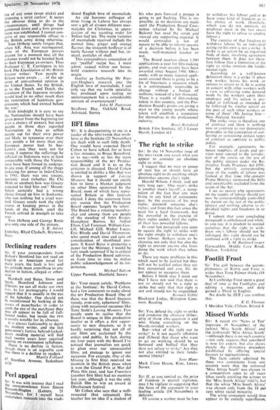The right to strike
Sir: In the 14 November issue of the SPTCTATOR you assert what you appear to consider an absolute right to strike.
I suggest that no man or group of men has or should have an absolute right to do anything whiCh diminishes anyone else's right.
Harold Wilson. I think, said not very long ago: 'One man's strike is another man's lay-off', a recog- nition of the fact that any man living in any kind of community may. by the exercise of his own rights, diminish someone else's rights: and from this fact arises the need for a legal framework, lest the powerful in the exercise of their rights unduly limit the rights of their less powerful fellows.
In your last paragraph you seem to equate the right to strike with the right simply to withdraw one's own labour. Strikers seem to be claiming not only that but also the right to prevent anyone else from doing the work which they refuse to do.
There are many problems in this which need to be tackled but they will not be tackled unless they are first recognised and you, Sir, do not appear to recognise them.
Before I finish may I point out that I have not said that there is not or should not be a right to strike but only that that right is not and should not be unqualified.
Bernard Gibbs Black nest Lodge, Brimpton Com- mon, Reading Sir: You defend the right to strike and condemn the offensive illiber- ality of those who question it and who blame everything on the bloody-minded workers.
But—what of the right not to strike? Is it not equally offensive and illiberal that those who want to go on working should be so harassed and bullied that they dare not refuse to strike? Are they not also entitled to their funda- mental liberty?
June Blanc Mark Cross House, Ripe, Lewes, Sussex Sir: If, as you remind us. the price of freedom is eternal vigilance, may I be vigilant in suggesting that the basis of the argument in your leading article (14 November) is deficient.
Of course a worker must be free to withdraw his labour and/or to have some kind of freedom as to his choice of work. (Similarly. which you do not mention, an employer must in the last resort have the right to refuse to employ labour.) The exercise of that freedom to withdraw labour by an individual acting on his own is not a strike. A strike is an action by an organised body of men, involving agreement between them. It does not there- fore follow that a limitation of the right to strike restricts the funda- mental right.
According to a well-known definition there is a strike 'if when one workei leaves his work or refuses to return to it, he is acting in concert with other workers with a view to enforcing some demand made by the workers upon their employer and his action is pre- ceded or followed or intended to be followed by similar action on the part of such other workers or some of them' (Mr Justice Sim— New Zealand Awards).
The strike issue is therefore one of contract and there is nothing new or contrary to our democratic principles in the conception of out- lawing or restraining certain types of contract as contrary to public policy.
For example, agreements be- tween suppliers of goods and ser- vices were opened to the jurisdic- tion of the courts on the test of the public interest under the Re- strictive Trade Practices Act .1956, but the entirely corresponding issue of the supply of labour was funked at that time (the-present Prime Minister sponsored the Bill) and inexplicably excluded from the scope of the Act.
I sec no reason why agreements on the supply of labour should not now he correspondingly controlled by statute on the test of the public interest and nothing adverse to in- dividual rights and freedoms in so doing.
I submit that your concluding paragraph is unbalanced and while. as you say, it is prudent to remind ourselves that the right to with- draw one's labour should not be infringed. this right should not be confused with a right to strike.
A. M. Burdon-Cooper Garscadden, Middle Cave Road, Malton, Yorkshire














































 Previous page
Previous page